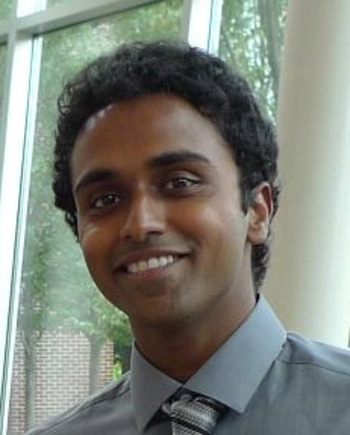ChE Seminar: Dr. Praveen Bollini
ChE Seminar: Dr. Praveen Bollini
| Event Date: | March 11, 2025 |
|---|---|
| Speaker: | Dr. Praveen Bollini |
| Speaker Affiliation: | University of Houston |
| Time: | 3:00-4:15 p.m. |
| Location: | FRNY G140 |
| Contact Name: | Joshua Gonzalez |
| Contact Phone: | 765-494-4365 |
| Contact Email: | jgonzal@purdue.edu |
| Open To: | Attendance required for ChE PhD students |
| Priority: | No |
| School or Program: | Chemical Engineering |
| College Calendar: | Show |

Bio:
Dr. Praveen Bollini obtained his Ph.D. degree from Georgia Tech in 2013 under the advisement of Christopher Jones, and completed a postdoctoral appointment under Aditya Bhan at the University of Minnesota in 2017 following a brief stint conducting heterogeneous catalysis research at The Dow Chemical Company. Since the Fall of 2017, he has been an Assistant Professor. Then Associate Professor in the Department of Chemical and Biomolecular Engineering at The University of Houston, where he leads a research group focused on developing a molecular-level understanding of diffusion, adsorption, and reaction phenomena occurring in nanoporous materials.
His group uses a range of synthetic, spectroscopic, kinetic, and reaction engineering tools to develop advanced adsorbents, catalysts, and reactors for the sustainable production of chemical and energy carriers. Current research themes include the development of metal-organic framework materials with biomimetic active sites, elucidation of structure-catalytic property relationships over bulk oxide catalysts, the development of dynamic approaches and advanced reactor configurations for effecting high temperature catalytic partial oxidation reactions, electrification of endothermic chemical processes, and the capture and conversion of CO2 from point sources and ambient air.
He is a recipient of the Georgia Tech Chemical Engineering Exceptional Academic Achievement Award, The Air Products Fellowship Award for Outstanding Graduate Research, the ACS PRF Doctoral New Investigator Award, a Scialog Fellowship, an Amazon Research Award for Sustainability Research, and the 2025 Aris Award from ISCRE. He has served as PI/Co-PI on projects accounting for over $25 million in funding from both federal and industrial sources, and as Chair of the Southwest Catalysis Society. He currently serves as a Board Member for the International Society of Chemical Reaction Engineering and on the Editorial Advisory Board for ACS Sustainable Chemistry and Engineering."Engineering Active Oxygens for Chemical Separations and Catalysis"
Abstract:
Oxygen atoms are ubiquitous components in materials used for chemical separations and catalysis applications. Examples include oxygen species present in supports used to immobilize amines for direct air capture, and active oxygen sites that participate in Mars-van Krevelen cycles that mediate the partial oxidation of light alkanes over oxide catalysts. In this talk I will discuss two distinct applications in which highly contrasting approaches are employed to fully exploit the properties of active oxygens, and in which key challenges can be overcome by understanding and engineering the physicochemical properties of these oxygens.
The first is the direct capture of CO2 from ambient air and its conversion to methane. Porous metal (hydr)oxides will be presented as a novel class of direct air capture sorbents in which aliovalent doping can be used to tune binding energies of CO2, and to render practicable the first instance of a dual-function capture and conversion material that is single-component in composition. The second example will focus on using dynamic operation to improve performance in the oxidative dehydrogenation of ethane to ethylene over supported Mo and V catalysts. I will demonstrate how an accurate understanding of the interplay between reaction kinetics and transport phenomena facilitates the development of approaches for improving ethylene selectivity despite the absence of kinetic artifacts such as non-zero oxygen pressure dependencies.
These contrasting approaches capture the diverse range of time and length scales over which physical and chemical phenomena need to be understood in an effort toward making progress against grand challenges such as CO2 capture from ambient air and the catalytic conversion of natural gas to value-added chemical products.
